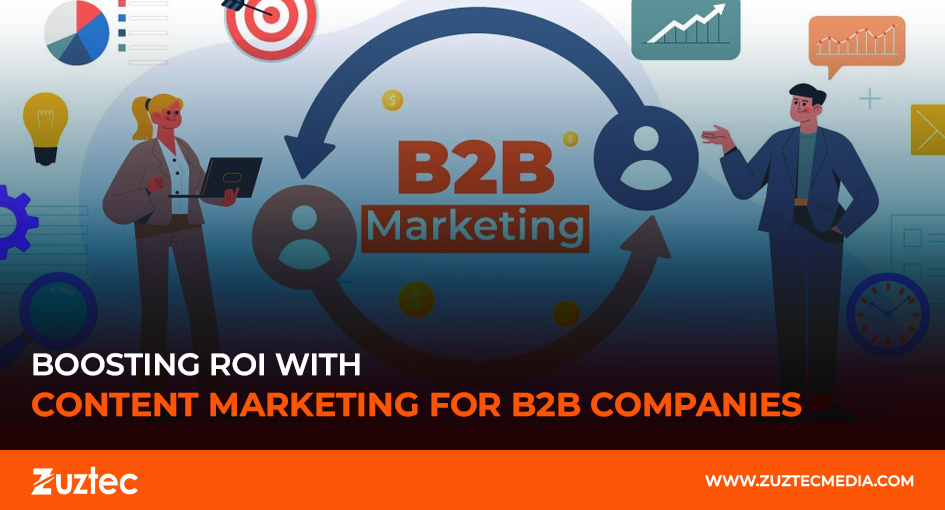
Boosting ROI with Content Marketing for B2B Companies
In the highly competitive world of B2B (business-to-business) sales, companies face constant pressure to refine their marketing strategies and achieve better return on investment (ROI). With a wide range of marketing tools available, one of the most effective and impactful strategies is content marketing for B2B companies. Content marketing allows businesses to connect with their target audience by providing valuable, educational, and relevant information that addresses their specific pain points and challenges. This strategy helps companies build authority within their industry, establish trust with their prospects, and foster long-term relationships with clients.
When executed effectively, content marketing can help B2B companies generate high-quality leads, enhance brand visibility, and improve customer retention ultimately driving more conversions and increasing ROI. However, with an overwhelming amount of content flooding the digital space, merely creating content is not enough to achieve success. The key lies in producing content that is not only valuable but also tailored to meet the unique needs and preferences of your target audience. In a crowded marketplace, personalized and strategically crafted content stands out and can help build stronger connections with potential customers.
This article will dive into how content marketing for B2B companies can be used to maximize ROI. We will explore how to develop a solid content strategy, optimize content for lead generation, and effectively nurture relationships with clients, ensuring that your content marketing efforts yield measurable, long-term benefits.
1. Content Marketing for B2B Companies: Developing a Content Strategy Aligned with Business Goals
The foundation of a successful content marketing for B2B companies strategy lies in aligning content creation with the overarching business objectives. Before diving into the world of content creation, B2B companies must clearly define their goals, whether it’s increasing website traffic, generating qualified leads, improving brand awareness, or boosting customer retention. Once these goals are established, the content strategy can be tailored to address the specific needs of your audience.
A well-defined content strategy begins with understanding your target audience. In the B2B sector, your audience might include decision-makers, business owners, and professionals in specific industries. Understanding their pain points, challenges, and information needs is key to creating relevant content. Additionally, it’s important to determine what types of content will resonate best with your audience—whether it’s blog posts, whitepapers, eBooks, webinars, case studies, or video content.
Creating content with a clear strategy ensures that your efforts are not only productive but also measurable. By focusing on high-value content that addresses your audience’s needs, B2B companies can position themselves as industry leaders and create a lasting relationship with their audience. This leads to a higher ROI, as your content is more likely to convert leads into loyal customers.
2. Optimizing Content for Lead Generation
Lead generation is one of the key goals of content marketing for B2B companies. Creating high-quality content is important, but it’s equally critical to ensure that content is optimized for capturing leads. This can be achieved by strategically placing calls-to-action (CTAs) within your content, encouraging visitors to take the next step in their buyer’s journey.
For example, whitepapers and eBooks are highly effective tools for lead generation. By offering in-depth, valuable content in exchange for contact information, B2B companies can capture leads that can be nurtured over time. Similarly, webinars, demos, and case studies can provide potential customers with real-life examples of how your products or services solve their business challenges, prompting them to take action.
Another effective approach is to use landing pages that are specifically designed for lead generation. A landing page that highlights the value of your content, explains how it addresses a prospect’s pain points, and provides an easy form to fill out can significantly improve lead capture rates. The more relevant and targeted the content, the more likely it will convert visitors into leads, ultimately boosting ROI.
3. Personalizing Content to Build Relationships
In the B2B space, personalization is crucial for cultivating long-term relationships with customers and prospects. Personalized content helps engage your audience more deeply, providing them with relevant solutions that directly address their business challenges. This is where segmentation becomes essential in content marketing for B2B companies.
By segmenting your audience based on factors such as industry, company size, role within the company, and business needs, B2B companies can create personalized content that speaks directly to each segment. For example, a piece of content targeted at senior executives in the technology sector will differ significantly from content aimed at marketing managers in the healthcare sector.
Moreover, using automation tools and CRM systems to track how users engage with your content can help tailor future content to their interests. Personalized email campaigns, product recommendations, and follow-up content that resonates with the individual or company’s needs can foster stronger relationships, improve customer retention, and boost the likelihood of repeat business. In turn, this personalization drives higher conversion rates and increased ROI, making it a vital component of content marketing.
In conclusion, content marketing for B2B companies is not just about producing articles or blogs, it’s about creating targeted, personalized content that resonates with your audience, nurtures leads, and drives conversions. By developing a well-planned content strategy, optimizing content for lead generation, personalizing interactions, and leveraging multiple distribution channels, B2B companies can significantly boost ROI. Continuous measurement and optimization of content performance ensure that these efforts continue to provide long-term, sustainable growth for businesses. Content marketing is a powerful tool, and when executed effectively, it has the potential to provide outstanding returns on investment for B2B companies.

